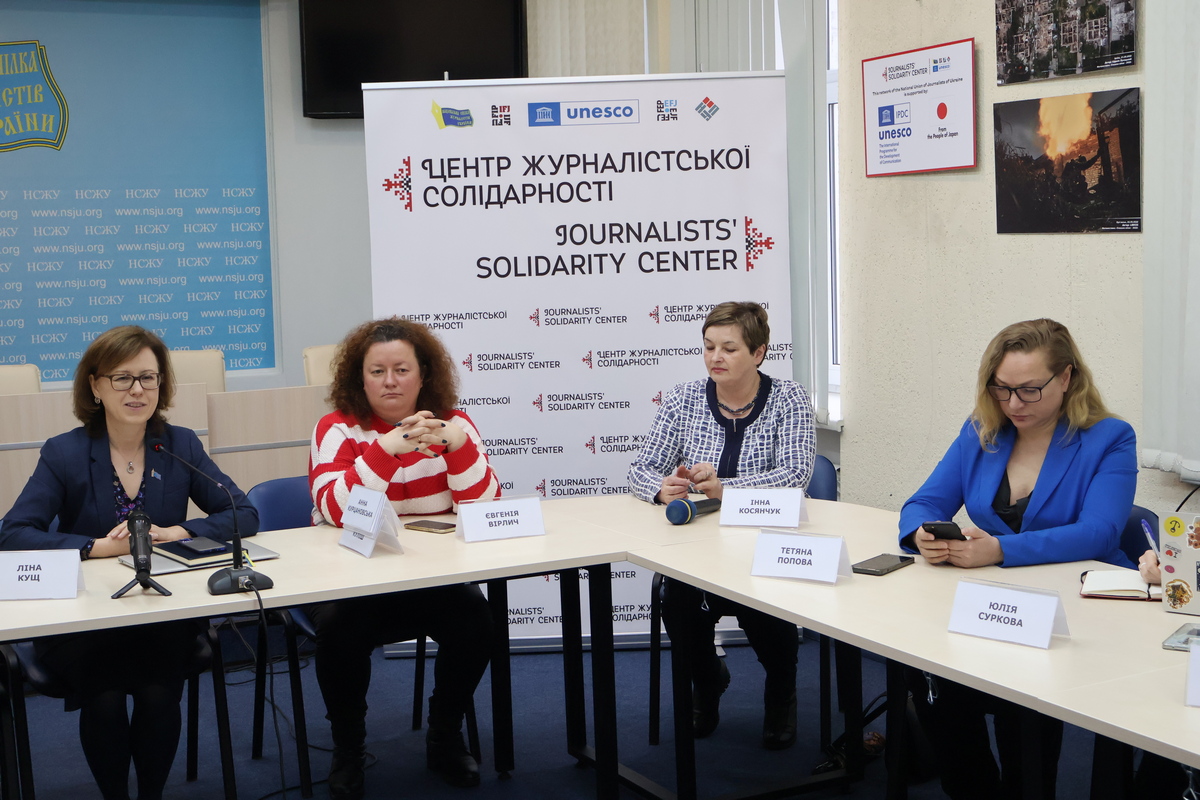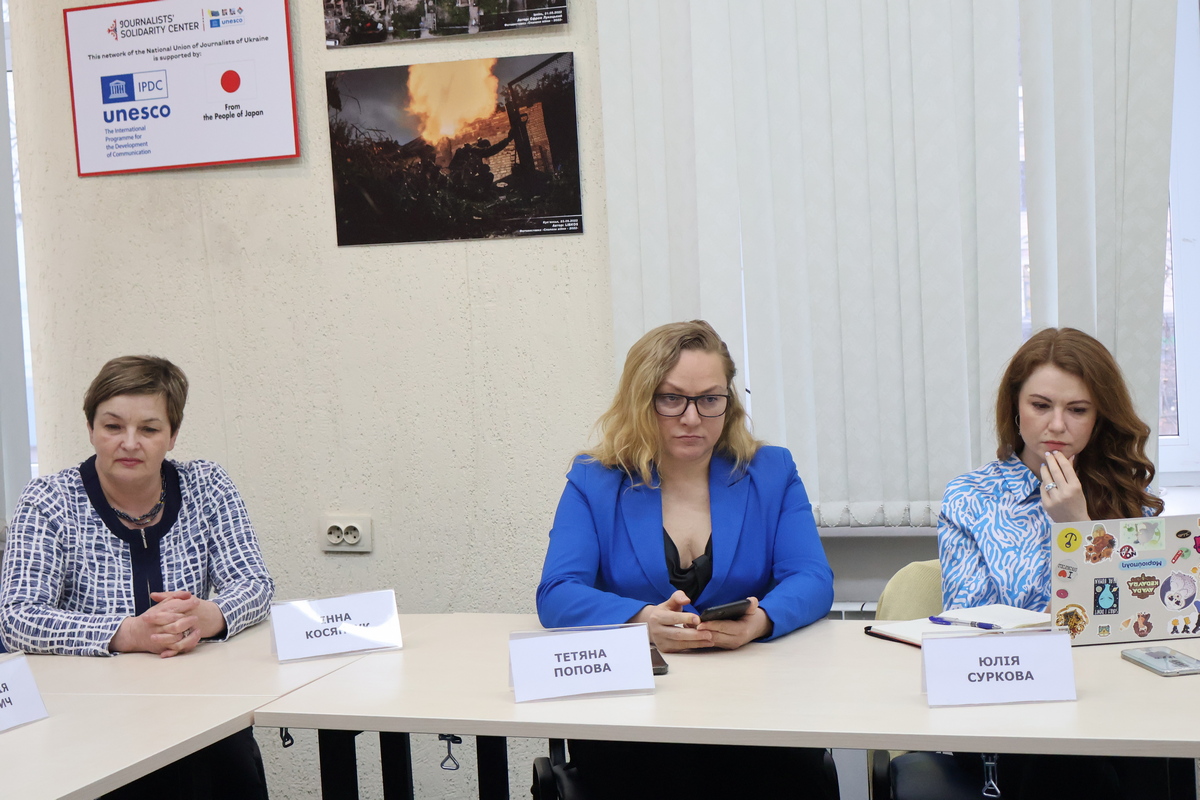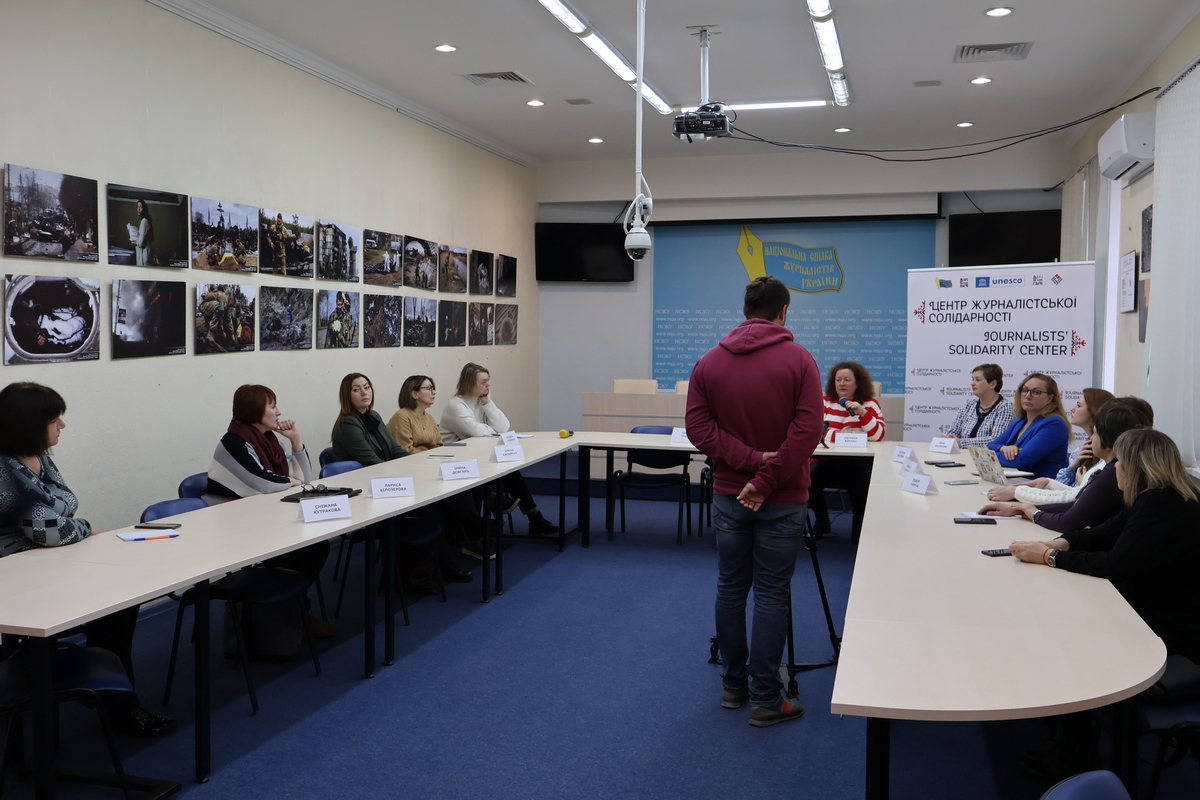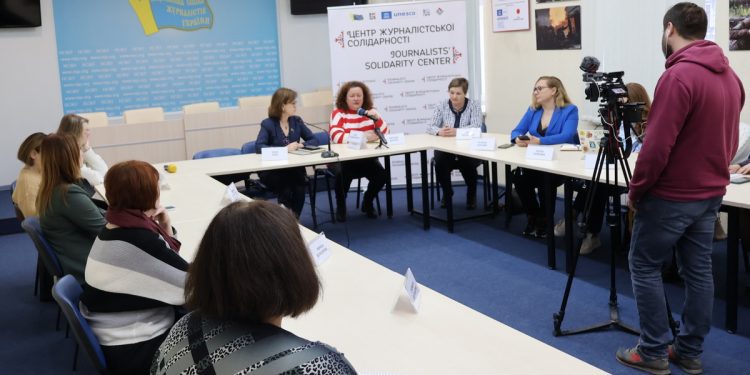How should a female journalist prepare for a trip to a war zone? What to do if you find yourself under occupation? The participants of the roundtable entitled Safety Of Female Journalists In Ukraine During The War organized by the National Union of Journalists of Ukraine (NUJU), covered these and other issues.
Female journalists face various challenges during the war. In particular, it threatens physical safety, illegal detention, psychological pressure, and economic and social insecurity.
“We are trying to build our activities to help journalists in accordance with how we can respond to these challenges,” noted NUJU First Secretary Lina Kushch. “For example, to ensure the physical safety of female journalists working on the front line, The NUJU has high-class protective equipment: body armor, helmets, and individual tactical first-aid kits. When body armor and helmets were ordered, they were expected to be different sizes. Including a small one for female journalists.”
Lina Kushch also noted that with the support of UNESCO, the NUJU could provide bulletproof vests weighing up to six kilos suitable for women.
During the round table, media women shared their experience of working in occupation and war zones, as well as survival methods in Russian captivity.
Terrible logic of occupation
“In the first days of the occupation, we didn’t believe that it would last long,” recalls the editor-in-chief of the Kherson publication Kavun.City, Yevheniya Virlych, lived under Russian occupation for four and a half months.
When we realized that it would be a long time, we relied on the experience of journalists from the occupied Donetsk Region, Luhansk Region, and Crimea. But the problem was, she says, that the Russians already knew how pro-Ukrainian media men and women defend themselves.

“In March last year, we did not understand: it is safer to stay or go. Because the Russians shot civilians’ cars if they didn’t like something: for the color – something reminded them of the colors of the flag, or they didn’t answer that way or the Ukrainian language. We began to develop new ways of responding to all this for ourselves,” Virlych shares.
The experience of… reading detective stories was useful.
“We used everything we’d learned from spy novels and detective stories,” notes Virlych.
According to her, many colleagues who left Kherson immediately did not understand the logic of the actions of the media workers who remained.
“Qualified, experienced colleagues distributed a blogger’s video – this could not be done in the occupation. Yes, a blogger made this mistake, but we are media people, and we have to be responsible for the content we share. Even if our hero made a mistake, even if they ask us to talk about some things, and we understand that they should not be given, we should not give them. It is important to understand: whenever you work with a person in occupation, or with a person who has left occupation, you have to put yourself in their place: this person cannot even leave their bedroom just like that because the neighbors will hear that she is at home and will turn them in or report that someone is in that house. Such a terrible logic that must be followed,” Virlych emphasized.
Yuliya Olkhovska, an investigative journalist displaced from the temporarily occupied Melitopol, says that she had to go to an interrogation with the Russian special services.
“I fully felt fear not only as a journalist or as a person but also as a woman. There were threats against my child. I wasn’t sure I would get out alive and well,” she shares.
According to Yuliya, the parents of a colleague who left were kidnapped, and in this way, they forced her to return.
“All journalists are in such a situation because almost all of them have relatives left in the occupation… You cannot return under any circumstances because it will not save your relatives. But this is a difficult moral choice,” Olkhovska summed up.
“A Ukrainian journalist can’t work in occupied Mariupol,” says Olena Kalaitan, who before the war was the head of the newsroom of the local newspaper Pryazovskyi Robochyi. “Because neighbors and colleagues will betray. You cannot write something, disguise yourself, and pretend you are on their side. Even those who remained in Mariupol communicated sparingly through text messages; no one said anything. We don’t hear phone stories at all. People who leave Mariupol now say: if you want to live or work, you must answer correctly to the question of who shelled Mariupol. Of course, they are the Banderovites [Bandera proponents], Ukrainian fascists.”
Working in a hot spot: preparation must be above everything else
The Insider’s journalist Tetiana Popova and Yuliya Surkova, a freelance journalist working with France Press, shared their experience working in a war zone.
Before going to the front, you need to get protective equipment, Popova reminded. And be sure to undergo training on safety and using first-aid kits.
“If you’ve had this training… you’re more careful, you know what you can do. Yes, if there is no shelling, you can record a stand-up, and when the shelling starts, you must hide. Be sure to take such trainings!” she stressed.
In addition, the media outlet advises having additional means of charging phones with you and choosing a hotel with a basement and wide walls in front-line settlements.

“Preparation for business trips to hot spots takes more time and effort,” states Yuliya Surkova.
In particular, she advises:
- Have personal medicines with you.
- Choose sports clothes, not synthetic ones, to cover the whole body, and comfortable shoes. However, it should not give the impression that you are a military man.
- Take cash with you.
- It is better to talk to a psychologist after a business trip.
Yuliya repeatedly went on business trips to hot spots. The journalist admits that it is psychologically challenging for her to say goodbye to home every time, but there are things she is forced to do.
“At one of the trainings in Britain, the coach asked: when you go to the front line, do you leave a will at home? I don’t leave; it’s hard for me. But I leave the numbers and pin codes of my bank cards, I leave the car keys, because each of us understands where one is going to, and each of us understands that one may not return,” the media woman noted.
Captivity is something that can be survived
This was emphasized by Liudmyla Huseinova, a civil journalist and volunteer who spent three years in Russian captivity in Donetsk and was released in October 2022. In particular, Liudmyla gave the following advice to women who were captured:
- do not argue with occupiers;
- do not talk to them in Ukrainian;
- tell yourself, “I have to survive, no matter what;”
- be prepared that captured women are stripped;
- as a rule, a bag is put on the head of the captives; there is no need to be afraid of this;
- do not cry – tears make the aggressor want to abuse even more;
- when they bring you to “prison,” they will give you a lawyer from the occupation authorities. Once you have a “lawyer,” you will not be beaten;
- ask the “lawyer” to transfer you to an official prison;
- be prepared for the fact that there will be women from different social strata with you in the cell. Try to understand these women, listen, and “find your place”.
As soon as captive women begin to be publicly discussed in the territory controlled by the Ukrainian authorities, they have a chance to save their health. “Therefore, it is necessary to speak loudly about those women who are still in captivity,” she emphasized.

Economic insecurity in the rear
Before the occupation, Lidiya Tarash headed the newsroom of the newspaper Nashe Slovo in Volnovakha. She survived the occupation, filtering, and departure to the territory under the control of the Ukrainian authorities. Here the media woman faced the problem of employment.
“When I left, I started looking for a job. Angels from the NUJU first helped me to leave with useful information, then at another meeting, I got to know my colleagues who invited me to work,” the media woman noted.
Inna Kosianchuk, a journalist for the Slovo newspaper, says that from February 24, 2022, the team is engaged in information volunteering.
“What is a local publication that has no funding from political parties or other sponsors, just lives on its own money?… We stopped publishing as a printed newspaper. We went online and started working with social networks,” Inna said.
According to her, the staff of many local newspapers is currently facing the issue of what to live on and where to find a part-time job.
“The NUJU cannot tell everyone: go there, and they will surely wait for you there. They do it whenever possible. There are excellent grant and scholarship opportunities. You have to look; the Union can also tell you where to look,” added Kosianchuk.
Larysa Bilozerova, a journalist on the Ukrainian Energy website, urged female journalists concerned about the problem of finding a job to pay attention to industry publications, which often lack good specialists.
 Journalists’ Solidarity Centers are an initiative of the NUJU implemented with the support of the International and European Federations of Journalists and UNESCO. The initiative is aimed at helping media representatives working in Ukraine during the war. The centers operate in Kyiv, Lviv, Ivano-Frankivsk, Chernivtsi, Zaporizhzhia, and Dnipro and provide journalists with organizational, technical, legal, psychological, and other types of assistance.
Journalists’ Solidarity Centers are an initiative of the NUJU implemented with the support of the International and European Federations of Journalists and UNESCO. The initiative is aimed at helping media representatives working in Ukraine during the war. The centers operate in Kyiv, Lviv, Ivano-Frankivsk, Chernivtsi, Zaporizhzhia, and Dnipro and provide journalists with organizational, technical, legal, psychological, and other types of assistance.
UNESCO is the United Nations Educational, Scientific, and Cultural Organization. It contributes to peace and security by promoting international cooperation in education, sciences, culture, communication, and information. UNESCO promotes knowledge sharing and the free flow of ideas to accelerate mutual understanding. It is the coordinator of the UN Action Plan on the Safety of Journalists and the Issue of Impunity, which aims to create a free and safe environment for journalists and media workers, thus strengthening peace, democracy, and sustainable development worldwide. UNESCO is working closely with its partner organizations in Ukraine to provide support to journalists on the ground. The designations employed and the presentation of material throughout this digest do not imply the expression of any opinion whatsoever on the part of UNESCO concerning the legal status of any country, territory, city, or area or its authorities or concerning the delimitation of its frontiers or boundaries. The authors are responsible for the choice and the presentation of the facts contained in this digest and for the opinions expressed therein, which are not necessarily those of UNESCO and do not commit the Organization.
Yevheniya Davydenko, NUJU information service

 THE NATIONAL UNION OF
JOURNALISTS OF UKRAINE
THE NATIONAL UNION OF
JOURNALISTS OF UKRAINE
















Discussion about this post